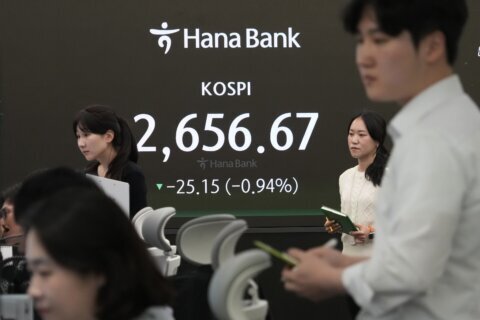PHNOM PENH, Cambodia (AP) — The United Nations expert on human rights in Cambodia proposed on Friday a 10-point plan to improve rights in the Southeast Asian nation, describing it as ä country with a bright future but some severe challenges.
U.N. Special Rapporteur Vitit Muntarbhorn spoke in the capital, Phnom Penh, at the end of an 11-day visit, his first in his official capacity. He said he met with government officials and members of civil society, U.N. agencies and concerned communities.
Vitit said Cambodia, which in the 1990s began recovering from many years of war and brutal misrule by the communist Khmer Rouge, had achieved substantial progress in human rights, including ratification of most major rights treaties.
“Yet Cambodia is faced with a pervasive paradox,” he said in a statement. “Since 2017, when the main opposition party was disbanded unjustly by judicial order, the country has effectively been under single-party rule, with all seats of the National Assembly in the hands of that monopoly.”
Cambodia’s Ministry of Foreign Affairs said it was “utterly dismayed” at Vitit’s recommendations.
“Despite very limited recognition of the progress and achievements Cambodia has realized, his statement remains largely biased, prejudiced, and unfounded on a number of issues,” it said in a statement.
Cambodian Prime Minister Hun Sen has been in power for 37 years, combining guile and strong-arm tactics to dominate his country’s politics. In late 2017, his administration cracked down on critics and political opponents in what was widely seen as clearing the way for his Cambodian People’s Party to stay in power in 2018 elections. Independent media outlets were closed or cowed into submission and the Cambodian National Rescue Party, the sole credible opposition group, was dissolved by the courts for allegedly engaging in treasonous activity.
Vitit told reporters he met with striking workers at a casino in Phnom Penh, local government officials in Sihanoukville — a southern city notorious for human trafficking and related cybercrime — and people displaced from their homes by land grabs. He also met with opposition party members and non-partisan critics of the government who have faced legal harassment.
According to a U.N. statement, Vitit’s recommendations include “opening up civic and political space, by suspending and reforming draconian laws, ensuring election-related personnel are separated from political parties and ending prosecution of political opposition and human rights defenders.”
Other measures include “releasing all those currently in prison and dropping charges against those who are seen as adversaries by the authorities and improving the quality of law enforcers by proper selection and incentivization and distance from political authority.”
Vitit spoke about people from various Asian countries who have been lured into taking jobs in Cambodia and then entrapped in virtual slavery, often forced to participate in scams targeting people over the internet.
The scam networks, which often have links to transnational organized crime, are set up in countries with weak law enforcement, luring educated young workers with promises of high earnings. The workers are then subject to isolation and the threat of violence unless they succeed in cheating victims reached by phone into transferring payments into overseas bank accounts.
Vitit said the human trafficking victims existed in a “living hell,” subject to torture and risking death if they tried to escape from detention in their closely guarded workplaces.
“Cambodia needs to activate counter-measures more strongly, while welcoming international cooperation and support,” he said.
Copyright © 2024 The Associated Press. All rights reserved. This material may not be published, broadcast, written or redistributed.






